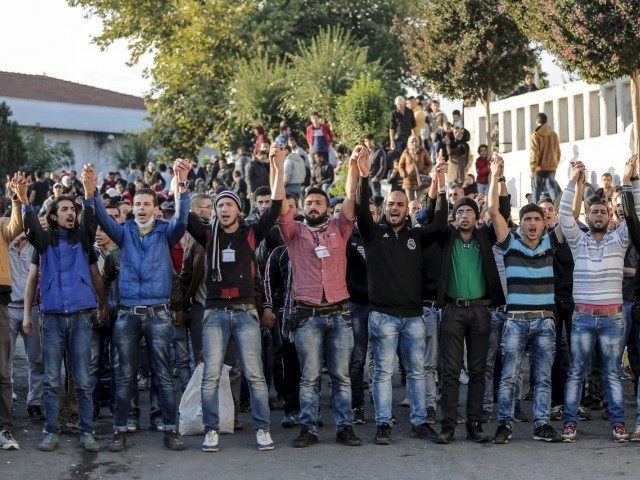Europe must close her doors and windows, the head of the European Council has said. In remarks following a meeting of the heads of state on Wednesday night, he warned that the migrant flood witnessed so far was only the beginning; the greatest tide of people is yet to come, necessitating renewed focus on securing Europe’s external borders.
As the migrant flood continues to rock the very foundations of the European Union, the heads of state and government of the Member States gathered at an informal crisis meeting in Brussels to discuss what can, and must, be done.
“Tonight our discussion was based on facts, not emotions,” Donald Tusk, the President of the European Council and former Prime Minister of Poland told reporters following the meeting.
“There are eight million displaced people in Syria, while about four million have fled to Syria’s neighbours. We should be talking about millions of potential refugees trying to reach Europe from Syria alone. Not to mention Iraq, Afghanistan, Eritrea and other places.” He said.
So far, only about two per cent of Syria’s refugees have made it to Europe. That figure is likely to rise significantly following Germany’s recent announcement that all Syrians who make it to her borders will be allowed to stay.
Tusk recounted: “Recently I visited refugee camps in Turkey and Jordan and I heard only one message: we are determined to get to Europe. It is clear that the greatest tide of refugees and migrants is yet to come.
“Therefore we need to correct the policy of open doors and windows. Now the focus should be on the proper protection of our external borders and on external assistance to refugees and the countries in our neighbourhood.”
Despite the rhetoric, however, the heads of state agreed to little, other than to throw more taxpayer money at the situation.
Arriving at the summit, Britain’s Prime Minister David Cameron told his colleagues: “We must make sure that people in refugee camps are properly fed, and looked after, not least to help them but also to stop people wanting to make or thinking of making this very, very difficult and very dangerous journey to Europe.”
To that end, the leaders agreed to splurge another €1 billon (£740 million) on aid programs, distributed via the UN’s Human Rights Council and the World Food Programme, and to increase aid to Jordan, Lebanon and Turkey where the majority of the refugees are currently living.
That spending will see Britain giving an extra £110 million, bringing the total to date up to £1.1 billion, the second highest sum donated by any country, after America.
“Leaders also agreed that the current chaos at our external borders must end,” Mr Tusk said. But despite daily scenes of violence and chaos across the continent as borders slam shut, and contrary to Mr Tusk’s hard-line rhetoric, the leaders were more timid on this front, agreeing only to set up “hotspots”, or specialist reception centres in Italy and Greece by the end of November – more than two months hence.
The hotspots would be used to identify, register and fingerprint migrants, allowing the migrant to either be relocated or returned.
However, the journalist Douglas Murray earlier this year travelled to Lampedusa, where illegal boats from Libya often unload their cargo of trafficked migrants. He reports:
“I asked every aid worker I could find if they knew of anybody being sent back home after arriving in European waters. Nobody could think of such a case. The truth is that once someone is here they stay because Europe cannot work out who is who (most people having deliberately come without papers) and even if they are clearly economic migrants they are never sent home. Europe had no workable system to do this when the movement was at a low-point. Now that it is at a historic high Europe has less than no system.”
As many as 350,000 migrants have registered for asylum in Europe since January 2015, according to the International Organisation for Migration. Germany is seeing an influx of migrants at the rate of 100 per hour, according to the Telegraph.
The influx is already testing relations between European leaders to breaking point. On Tuesday night Hungarian Prime Minister Victor Orban accused the German Chancellor Angela Merkel of “moral imperialism” after a mandatory 120,000 migrant quota scheme was forced through against the wishes of governments and their people, using qualified majority voting.
A Hungarian official has ridiculed the decision, saying that the plans would never work. “’Mohammed, here is your flight to Stuttgart. Ahmed, here is your flight to Bucharest.’ Will Ahmed be happy? Two hours later he will be on the run to Germany,” he said.
“It has been designed in buildings that have never seen what is going on in the ground. The house is burning and we plan to submit legislation in three months’ time.”
Hungary’s Foreign Minister Péter Szijjártó has called the quota scheme a “waste of time.” He has proposed three policies designed to tackle the problem: “We must establish a joint EU force that is capable of protecting Greece’s borders, EU funding must be provided to existing refugee camps, and transit countries must be given financial assistance,” he said, adding: “One of the many reasons the compulsory quota system is unsatisfactory is that many more people have entered the European Union since the original debate on the distribution of 120,000 immigrants.”

COMMENTS
Please let us know if you're having issues with commenting.